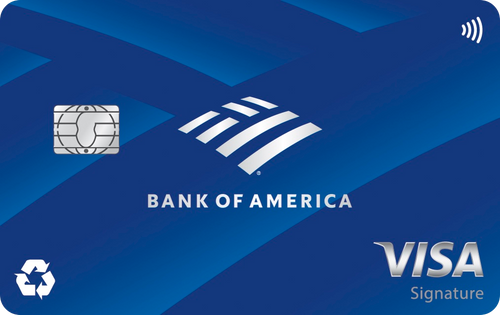Summary
The Bank of America Travel Rewards card and the Capital One Venture Rewards Credit Card are two of the more robust options when it comes to bonus offers and redemption flexibility – which is best for you?
The content on this page is accurate as of the posting date; however, some of our partner offers may have expired. Please review our list of best credit cards, or use our CardMatch™ tool to find cards matched to your needs.
No matter the time of year, travel rewards cards are always in season. What’s important is identifying the right card that meets your business or personal travel needs. The Bank of America® Travel Rewards credit card and the Capital One Venture Rewards Credit Card are two of the more robust options when it comes to bonus offers and redemption flexibility. But which one has more gas in the tank? Let’s take a look:
Bank of America Travel Rewards vs. Capital One Venture
 |  | |
|---|---|---|
| Rewards rate |
|
|
| Sign-up bonus | 25,000 points if you spend $1,000 in first 90 days | 75,000 miles if you spend $4,000 on purchases in the first 3 months |
| Annual fee | $0 | $95 |
| Estimated yearly rewards value ($15,900 spend) | $239 | $233 |
| Pros |
|
|
| Cons |
|
|
Rewards and sign-up bonus
For starters, the Capital One Venture’s rewards package is quite good for a mid-tier travel card. On hotels and rental cars booked through Capital One Travel, it gives 5X miles. However, its real strength is its 2X miles on every purchase – a high rewards rate on general purchases, even among the best travel credit cards. The sign-up bonus is decent as well: 75,000 miles if you spend $4,000 in three months. That welcome offer alone is worth $750 if you redeem it for travel on the Capital One Travel portal.
The Bank of America Travel Rewards card gives a flat rate of 1.5X points on all purchases, which is pretty average. However, it offers 25,000 (worth $250 for travel) points after spending $1,000 in the first 90 days, which makes the sign-up offer more attainable than the Capital One Venture card’s.
Over all, with the higher value of its sign-up bonus and higher earning rate on general purchases, the Capital One Venture wins on the rewards front.
Annual fee
If you’re averse to budgeting for an annual fee, the Bank of America card is the way to go. The Capital One Venture charges $95 per year to keep the card open.
Note, though, that if you tend to spend a moderate amount on credit cards, you should give the Venture card a second look – with its 2X earning rate, its rewards value can easily outmatch the fee (our estimate is for a $15,900 yearly budget).
Rewards redemption flexibility
While the rewards packages are different, the redemption options are fairly similar. Both have no earning limits or points expiration. There are no blackout booking dates on either card, and you can redeem points for any purchase. One minor difference is that the Bank of America Travel Rewards lets you redeem points for a statement credit for up to 12 months after making a travel or dining purchase.
The Bank of America Travel Rewards allows you to redeem points for travel, cash, gift cards and more. Keep in mind, however, that you must have at least 2,500 points to convert your points into travel credit or cash, and 3,125 points for gift cards.
Capital One miles are more versatile, especially since Capital One has been building up its travel rewards program over recent years. You can redeem your miles for travel booked through the Capital One Travel portal, gift cards or cash. You can also transfer your miles to Capital One’s 15+ travel partners, including Avianca, British Airways, Flying Blue, Wyndham Rewards and more. Most transfer rates are 1:1 but some have 2:1.5 ratios. That doesn’t seem like a great deal, but if you’re already a loyal flyer with a specific airline, this works to your advantage.
Bank of America Travel Rewards: Best for simple traveling and no annual fee
It’s no surprise that Bank of America customers can benefit most from this card. If you’re enrolled in the Bank of America Preferred Rewards program and have at least $20,000 in combined accounts at Bank of America or Merrill, you can earn up to a 75% points boost.
Even for the non-Bank of America customer, the card is a solid choice. In addition to its regular 1.5X rewards, you can earn an additional 3 points per dollar when you book travel through the Bank of America Travel Center. All you can top all of that off with no annual fee.
Compared with the Capital One Venture card, the Bank of America Travel Rewards card has the advantage on points. Based on a 1.5X rate times a yearly spend of $15,900 and multiplied by 0.01 (1 cent per point), the Bank of America Travel Rewards card will give you around $239 in the first year. However, the Capital One Venture card, with an average reward rate of 2.06, the same $15,900 yearly spend and a 1-cent point value comes out to $233, after subtracting the annual fee.
| Estimated earnings based on $15,900 yearly spend | |
|---|---|
| Bank of America Travel Rewards credit card | Capital One Venture Rewards Credit Card |
| 1.5 (average rewards rate) X $15,900 (yearly spend) X 0.01 (point value) = $238.5 | (1.06 (average rewards rate) X $15,900 (yearly spend) X 0.01 (point value)) – $95 (annual fee) = $232.54 |
We have to mention that there’s no real motivation to redeem points for travel via the Bank of America Travel Center since your card doesn’t increase the points’ value, like some competitor cards. Plus, prices on the Bank of America Travel Center are comparable to those on other travel sites. This is why we recommend it to simple travelers who don’t want to deal with the fuss of more robust travel programs.
Capital One Venture Rewards: Best for planning a trip soon
Talk about getting off to a fast start! With 75,000 miles if you spend $4,000 on purchases in the first three months and a full menu of travel purchasing options, the Capital One Venture provides a lot of up-front value. For those planning a trip for within the next few months, the 75,000-mile welcome offer will cover a substantial part of your vacation.
Some additional benefits include up to $250,000 of travel accident insurance, car rental insurance and up to $100 for Global Entry or TSA PreCheck. There’s also no foreign transaction fee – a welcome perk to balance out the $95 annual fee. One drawback is the low cash back rate, which is 0.5 cents per mile. So, if you’re looking for cash back rewards, it’s not this card’s strength. But for the frequent travelers who spend a lot of time overseas, the Venture is much more attractive rewards option.
If we discuss purely numbers (especially factoring in the Preferred Rewards points boost), the Bank of America Travel Rewards card has the advantage. However, the Capital One Venture Rewards card is a great gateway card to some of the best travel rewards programs. Plus, the option to transfer miles makes an already flexible travel card even more flexible and valuable.
Bottom line
What kind of traveler are you? Whether you like to take the occasional spur-of-the-moment trip or make strategic plans for yearly travel, one of these cards should set you on the right path. You’ll have plenty of redemption flexibility with either option. But when making your decision, consider what’s most important to you regarding rewards rates and paying an annual fee.
Editorial Disclaimer
The editorial content on this page is based solely on the objective assessment of our writers and is not driven by advertising dollars. It has not been provided or commissioned by the credit card issuers. However, we may receive compensation when you click on links to products from our partners.





